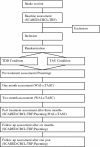Effectiveness of a cognitive-behavioral therapy (CBT) manualized program for clinically anxious children: study protocol of a randomized controlled trial
- PMID: 22404798
- PMCID: PMC3316128
- DOI: 10.1186/1471-244X-12-16
Effectiveness of a cognitive-behavioral therapy (CBT) manualized program for clinically anxious children: study protocol of a randomized controlled trial
Abstract
Background: In the Netherlands, the prevalence of anxiety disorders is 20%; and children with anxiety are at increased risk for psychopathology throughout adulthood. Recently, a revised version of a cognitive behavioral therapy manualized program called 'Thinking + Doing = Daring' (TDD) was developed for children between 8 and 12 years old with an anxiety disorder. The main aim of this project is to conduct a Randomized Controlled Trial (RCT) to evaluate the effectiveness of TDD.
Methods/design: The CBT program will be tested with a RCT with 120 clinically anxious children (8-12 years old) referred to one of three mental health care agencies. Children will be randomly assigned to the experimental (N = 60, TDD) or to the control condition (N = 60, treatment as usual). The primary outcome measure will be the child's anxiety symptoms level. Secondary outcome measures will be externalizing (e.g. aggression) and internalizing problems (e.g. depression). Two potential mediators of change will be examined in the current study: therapeutic alliance and parenting. Mother and child in both the experimental and control condition will be surveyed at baseline, post treatment and after 6 and 12 months (follow-up). It is hypothesized that children in the experimental condition will show a stronger decrease in anxiety symptoms compared to children that receive treatment as usual. Moreover, we expect that a strong therapeutic alliance and decreases in parental control and rejection will contribute to treatment success.
Discussion: Early treatment for anxiety problems has the potential to not only result in anxiety reductions, but also to prevent future problems such as substance abuse and psychopathology throughout adulthood. Our results will be immediately relevant to practice, since we are partnering with 'real world' community agencies. If the CBT program proves more effective than treatment as usual, it could be implemented in community mental health care agencies across the Netherlands and beyond. Moreover, it has the potential to make treatment in these community settings shorter, more efficient and therefore cost-effective.
Trial registration: Nederlands Trial Register NTR2967.
Figures
References
-
- Costello EJ, Angold A. Developmental Psychopathology. Vol. 1. New York, NY: John Wiley & Sons; 1995. Developmental epidemiology; pp. 23–56.
-
- Kroes M, Kalff AC, Kessels AGH, Steyaert J, Feron FJM, van Someren A. et al.Child psychiatric diagnoses in a population of Dutch schoolchildren aged 6 to 8 years. Journal of the American Academy of Child and Adolescent Psychiatry. 2001;40(12):1401–1409. doi: 10.1097/00004583-200112000-00010. - DOI - PubMed
-
- Muris P. Angsstoornissen bij kinderen. Diagnostiek en behandeling voor de professional. Amsterdam: Hogrefe; 2010.
Publication types
MeSH terms
LinkOut - more resources
Full Text Sources
Medical


